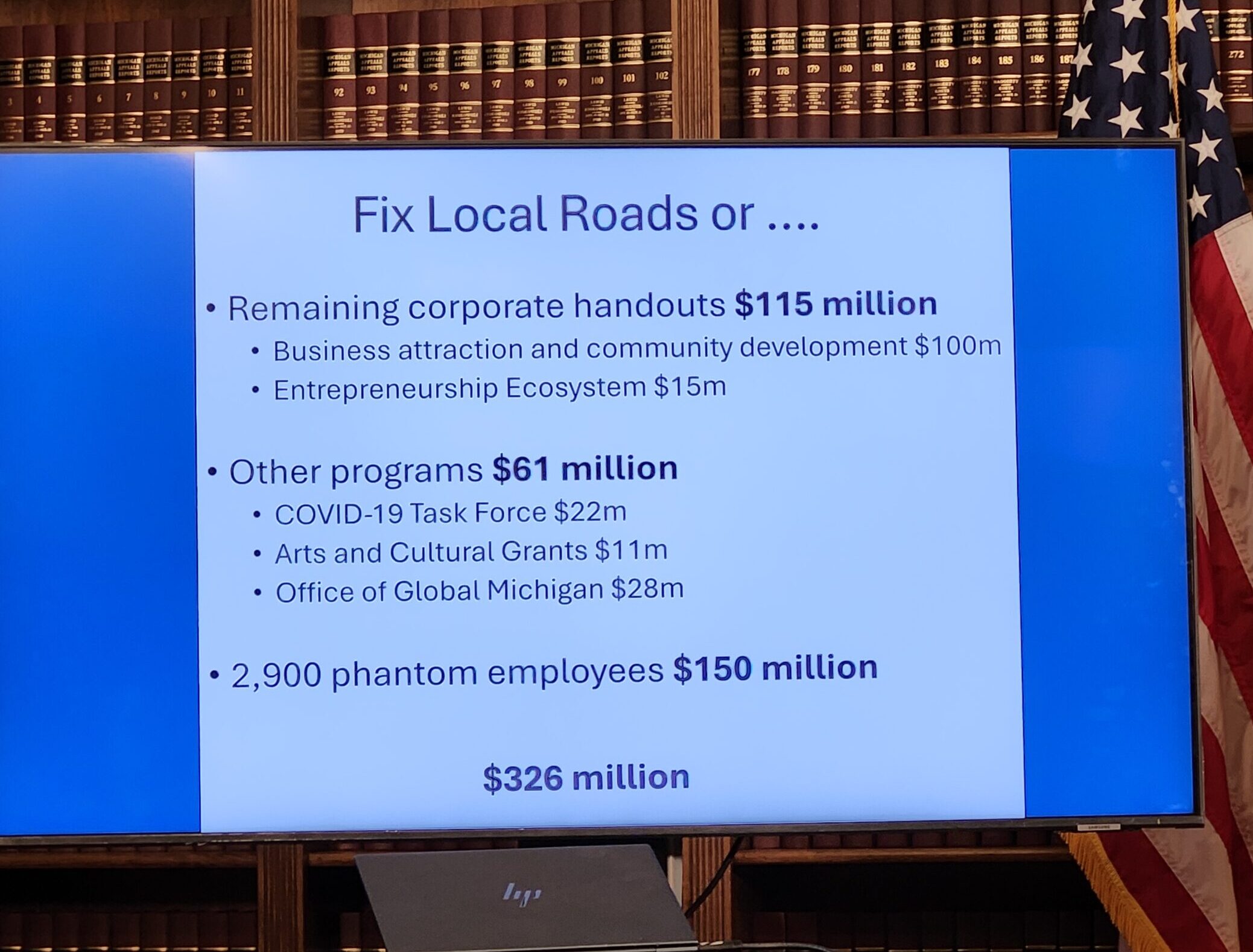Michigan House Speaker Matt Hall said Tuesday that it wouldn’t be difficult to cut $326 million from state government to pay for road funding – but the items that could be on the chopping block include a key DEI and refugee resettlement program, arts and culture grants and money for the state’s COVID-19 Task Force.
Hall (R-Richland Township) keyed in on those items during a regularly scheduled news briefing with reporters. Although the House has yet to pass a budget like its Senate counterpart, Hall said his Democratic colleagues have told him that finding $320 million in cuts to divert to roads would be nearly impossible or costly to the state in the long run.
Not so, Hall said Tuesday, touting at the very least a potential framework for making deep cuts. The speaker said he and Rep. Ann Bollin (R-Brighton), chair of the House Appropriations Committee, were going line-by-line to find maximum benefit for taxpayers in their version of the budget.
Hall showed where they might be going with a slide presented during Tuesday’s briefing,
The largest item on the block was $115 million in what Hall said were remaining corporate handouts. That includes $100 million in business attraction and community development money and $15 million for entrepreneurship ecosystem funding.
Additional cuts Hall noted that could be made included $61 million from other programs – the top line being $28 million from the Office of Global Michigan. The office is a creation of Gov. Gretchen Whitmer’s administration, and touts itself as the state’s arm in advancing equity and inclusion initiatives throughout the state. The office also facilitates smooth transitions for newcomers from foreign countries, immigrants, refugees and members of marginalized communities.
Of that remaining $61 million, Hall eyed $22 million in cuts from the COVID-19 Task Force, also created by Whitmer, and $11 million in arts and culture grants.

Hall did not mince his words on cuts for “corporate handouts.”
“None of them, and none of these things are resulting in any job creations,” Hall said. “We’re just saying local roads are probably more important to most people than these big corporate giveaways.”
Nor did he pull his punches at the various social programs that could see cuts.
“The COVID-19 Task Force. … What are these people doing?” Hall asked. “Are they going around asking people to wear masks still? I’ve talked about the arts and cultural grants. The Capital City Film Festival, barbershop quartets, I mean, it’s incredible. What’s more important, puppet art, or roads? I think most people in Michigan would say roads.”
Whitmer’s Office of Global Michigan was another area Hall appeared to see as expendable in any House-passed budget, saying that the initiative housed and subsidized “illegal aliens.” That office has been a target of Republicans for its Newcomer Rental Subsidy program, which they contend encourages illegal immigration by providing up to a year of rental assistance for “Refugees and other Newcomer population-eligible households,” even though eligibility is based on having a legal immigration status.
Another $150 million could be eliminated, he said, by cutting 2,900 unfilled state government positions, which Hall called phantom jobs. The speaker said the fact that the state hasn’t filled those positions was, in his view, a product of government expanding too quickly and without a plan.
Overall, Hall said the slide illustrated that deep cuts were possible despite objections from the House chamber’s Democrats.
“It’s very easy to do, and there’s a lot more things that we could cut,” Hall said. “I just put this up here for simplicity to show you some things that we’re contemplating that are very easy to cut in this budget.”
GET THE MORNING HEADLINES.
